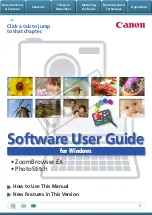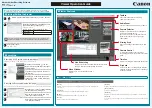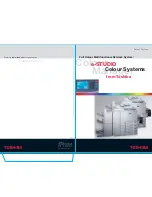
PKI
Public-key infrastructure. Security technology based on digital certificates and the assurances provided by strong
cryptography. See also
certificate authority
,
digital certificate
,
public key
,
private key
.
print template
Formatted template used to generate guest account receipts.
private key
The part of a public/private key pair that is always kept private. The private key is used to encrypt a
message’s signature to authenticate the sender (only the sender knows the private key). The private key is also used
to decrypt a message that was encrypted with the sender’s public key (only the sender can decrypt it).
public key
The part of a public/private key pair that is made public. The public key is used to encrypt a message; the
recipient’s private key is required to decrypt the message. A large part of a digital certificate is the certificate owner’s
public key.
QuickConnect App
Application used to securely provision an Android, Windows, or OS X device and configure it
with network settings.
RFC
Request For Comments; a commonly-used format for Internet standards documents.
role
Type of access being granted. You can define multiple roles. Such roles could include employee, guest, team
member, or press. Roles are used for both guest access (user role) and operator access to Dell Networking W-
ClearPass Guest. See
operator profile
.
root CA
Certificate authority that signs its own certificate (a self-signed certificate), and must be explicitly trusted
by users of the CA.
SCEP
Simple certificate enrollment protocol. Protocol for requesting and managing digital certificates.
self-signed certificate
See
root CA
.
session
Service provided by a NAS to an authorized user.
skin
Web site’s external appearance, or “look and feel.” It can be thought of as a container that holds the
application, its style sheet (font size and color for example), its header and footer, and so forth.
SMS
Short Message System; a method for delivering short messages (up to 140 characters) to mobile phones.
sponsor
See
operator
.
TLS
See
EAP-TLS
.
trust chain
Sequence of certificates, starting at a trusted root certificate, that establishes the identity of each
certificate in the chain.
trusted root
See
root CA
.
unique device credentials
Network authentication credentials that uniquely identify the device and user and enable
management of provisioned devices. May be a username and password or a TLS client certificate, depending on the
type of device.
user database
Database of the guests on the system.
view
Table containing data. Used to interactively display data such as visitor accounts to operators.
visitor/guest
Someone who is permitted to access the Internet through your Network Access Server.
VPN
Virtual private network. Enables secure access to a corporate network when located remotely.
VSA
Vendor-specific attribute.
walled garden
Network resources that can be accessed by unauthorized users through the captive portal.
Web login
Login page displayed to a visitor.
X.509
Standard defining the format and contents of digital certificates.
Dell Networking W-ClearPass Guest 6.0 | Deployment Guide
Glossary | 309
Summary of Contents for Networking W-ClearPass Guest 6.0
Page 1: ...Dell Networking W ClearPass Guest 6 0 Deployment Guide ...
Page 12: ...12 DellNetworking W ClearPass Guest 6 0 Deployment Guide ...
Page 26: ...26 Use of Cookies DellNetworking W ClearPass Guest 6 0 Deployment Guide ...
Page 64: ...64 About SMS Guest Account Receipts DellNetworking W ClearPass Guest 6 0 Deployment Guide ...
Page 218: ...218 Viewing the Hotspot User Interface DellNetworking W ClearPass Guest 6 0 Deployment Guide ...
Page 260: ...260 Automatic Logout DellNetworking W ClearPass Guest 6 0 Deployment Guide ...
Page 310: ...310 Glossary DellNetworking W ClearPass Guest 6 0 Deployment Guide ...
Page 320: ...320 Index DellNetworking W ClearPass Guest 6 0 Deployment Guide ...












































